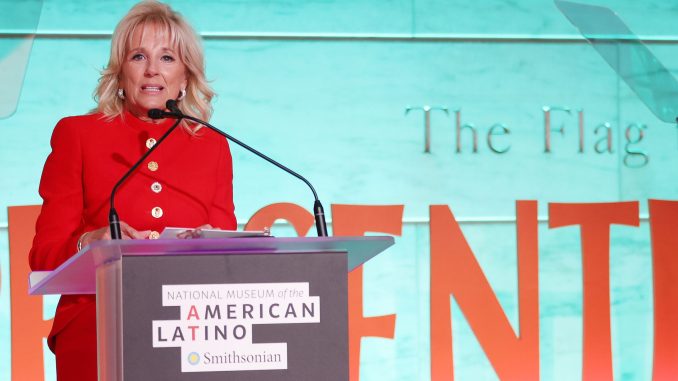
The growing controversy over the Smithsonian Institution’s planned National Museum of the American Latino is making one thing perfectly clear: The once-august organization cannot now be trusted to refrain from “decolonizing” history.
The recent revelation that it hired two radical professors to create a second forerunner to the museum, an exhibit aimed at making Hispanics question capitalism, makes its proclivities clear. The Smithsonian only got cold feet and suspended the second exhibit to the museum late last year after critics complained that the first precursor exhibit was absurdly Marxist.
As two of the three critics who raised the alarm, in a column for The Hill newspaper in August last year, we are happy to have contributed to making the Smithsonian hit the pause button on yet another project to radicalize Hispanics by telling them they are victims in America.
But we also take no pleasure in being proven right, again, that the coming National Museum of the American Latino has been set up to promote a leftist take on the experience of Hispanics in the United States, and Congress must scrap the project altogether.
One need only consider that the museum’s 18-member Scholarly Advisory Committee, which is responsible for reviewing all exhibits, is dominated almost completely by woke professors, researchers, and activists whose work focuses on advancing culturally Marxist concepts such as critical race theory and gender and queer theory. Many teach the academically questionable subject of “Latinx” studies.
What can one expect from this museum?
The first exhibit, “Presente! A Latino History of the United States,” made clear to us after it opened its doors in June 2022 at the National History Museum, that the upcoming Museum—created by Congress in the giant omnibus COVID-19 bill in the waning days of 2020, and yet to be built—will be used to curate neither art nor history, but grievances and resentments against the United States.
That the second exhibit—ostensibly devoted to “civil rights”—was going to be more of the same, or worse, should now prove this to everyone else.
A Time magazine article this month revealed that two scholars—Felipe Hinojosa of Baylor University and Johanna Fernandez of Baruch College—had been working for two years on the second exhibit. It also revealed that the Smithsonian told them to cease and desist in an email last Nov. 28. In a subsequent phone conversation, the Latino Museum’s director, Jorge Zamanillo, told them their exhibit would interfere with funding.
Hinojosa and Fernandez were not told why, but Time additionally reports that “they believe it was because they planned to feature a variety of countercultural organizations of the 1960s that questioned how well American democracy was meeting the needs of its citizens under a capitalist system.”
Time reported that the Smithsonian confirmed halting the exhibit, and added that new one on salsa and Latin music “is being developed in its place.”
The article quotes Hinojosa as saying, “The tragedy and really the story here is around who controls the future of Latino history.”
Hinojosa is not wrong. We think it would be dangerous for professors like him and Fernandez, or the members of the museum’s Scholarly Advisory Committee, to control how the history of these immigrant groups is told. Taxpayers should definitely not fund an effort to divide America.
Quick research reveals that Fernandez is a socialist who also lobbies for the release of cop-killer Mumia Abu-Jamal. She edited a prison book by Mumia, and, in a 2021 Workers’ World Party webinar, Fernandez said that Mumia “has a critique of the state and of capitalism. This means that he represents a continuity in the black radical tradition, a continuity in black radical descent from the 1960s to the present.”
Hinojosa, for his part, sympathizes with Latin America’s liberation theology, which proposes that the church should be an instrument of mobilization and even revolution to overturn the traditional structures of society. Hinojosa militates for the preservation of Hispanics as a separate group inside the U.S., rejecting assimilation, and no doubt would have used the exhibit now suspended to promote this separatism.
“What the 1960s and 1970s did for Latinos, especially the rise of liberation theology, was to be able to see themselves in a brand new way, to be able to rearticulate their identity, to reject this notion that they were to just assimilate and become white Americans, to take on a brown identity, a sense of difference and a connection with indigenous roots … . That was a beautiful moment,” Hinojosa told a podcaster in 2021.
These are the people the Smithsonian hires to shape the identity of Hispanics.
It was perhaps inevitable that Hispanics would find themselves smack in the middle of the culture wars. The group now comprises almost one-fifth of the U.S. population. At 60 million strong, they have begun to drift rightward, and progressives are getting desperate.
Congress appeared to get what was happening, and the House Appropriations Committee in July passed a funding bill that cut the museum’s funding. But Republican members of Congress then met later that month with Smithsonian leaders who made reassurances that they had learned their lesson. Sources tell us that the Smithsonian leaders told members that they had “fired” people, presumably a reference to Fernandez and Hinojosa.
But members of the House of Representatives need to understand that they were apparently lied to. Despite the assurances of bipartisanship by Smithsonian leadership, the museum is controlled by woke academic elites who only want to recruit Hispanics into the victimhood Olympics.
Originally published at FoxNews.com
The Daily Signal publishes a variety of perspectives. Nothing written here is to be construed as representing the views of The Heritage Foundation.
Have an opinion about this article? To sound off, please email letters@DailySignal.com and we’ll consider publishing your edited remarks in our regular “We Hear You” feature. Remember to include the url or headline of the article plus your name and town and/or state.

